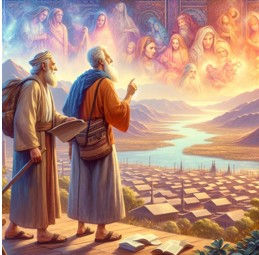Reflection by The Rev'd Dr Deborah Broome
- Oct 29, 2025
- 3 min read

Called to be Saints
In Christ we have also obtained an inheritance, having been destined according to the purpose of him who accomplishes all things according to his counsel and will, so that we, who were the first to set our hope on Christ, might live for the praise of his glory. In him you also, when you had heard the word of truth, the gospel of your salvation, and had believed in him, were marked with the seal of the promised Holy Spirit; this is the pledge of our inheritance toward redemption as God’s own people, to the praise of his glory.
I have heard of your faith in the Lord Jesus and your love toward all the saints, and for this reason I do not cease to give thanks for you as I remember you in my prayers, that the God of our Lord Jesus Christ, the Father of glory, may give you a spirit of wisdom and revelation as you come to know him, so that, with the eyes of your heart enlightened, you may perceive what is the hope to which he has called you, what are the riches of his glorious inheritance among the saints, and what is the immeasurable greatness of his power for us who believe, according to the working of his great power. God put this power to work in Christ when he raised him from the dead and seated him at his right hand in the heavenly places, far above all rule and authority and power and dominion and above every name that is named, not only in this age but also in the age to come. And he has put all things under his feet and has made him the head over all things for the church, which is his body, the fullness of him who fills all in all. Ephesians 1:11-23
On All Saints’ Day (1 November, but most parishes celebrate it this Sunday) we remember not only the famous saints of history, but also the everyday ones – those who’ve shaped our lives with love, faith, and quiet witness. We give thanks for all the “official saints,” those the Church has specially acknowledged, and also for the saints we’ve personally known, those who’ve helped us on our journey, who’ve spoken God into our lives. And the other thing we do on All Saints’ Day is get back to the idea of saints as living people. Back when the New Testament letters were being written, the “saints” were simply the church: the word is literally “the holy ones” – and that meant everyone who was within the various Christian communities. The letter to the Ephesians reminds us that sainthood isn’t about perfection or fame. It’s about being called – chosen by God to live for Christ’s glory.
The writer tells the Ephesians/tells us we’ve received an inheritance in Christ, and that we’re marked with the Holy Spirit. This isn’t just about the past or the future – it’s about how we live now. As saints, we’re called to be holy – which might seem like a big ask, except that to be a saint is mostly about living with the awareness that God is present in our ordinary lives. Holiness begins not with doing more, but with noticing more – seeing God at work in the garden, the classroom, the kitchen, or the quiet conversation with a friend.
All Saints’ Day reminds us that we’re part of a great communion — past, present, and future — and that each of us is called to reflect God’s love in our own way. You don’t have to be someone else to be a saint. You are called to be fully yourself, living in the presence of God. This week, try noticing one moment each day when you sense God’s presence. That awareness might just be the beginning of holiness.



Comments